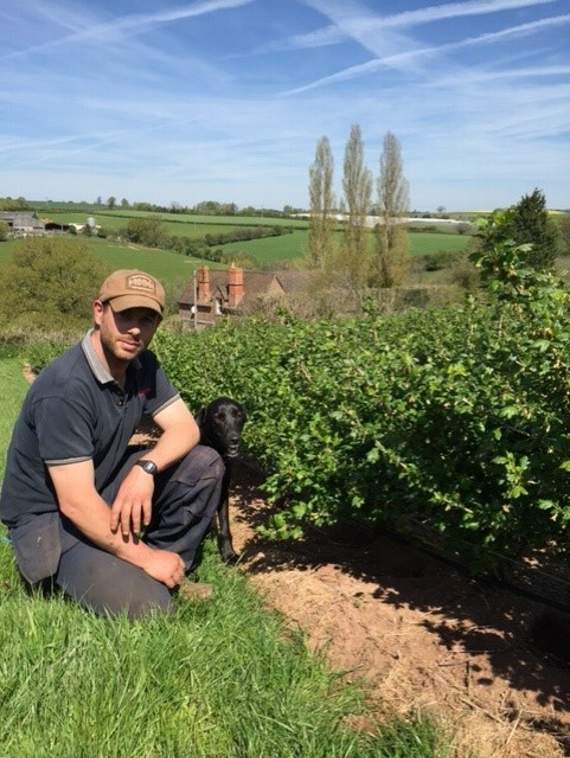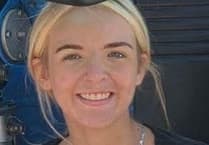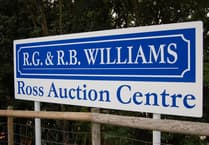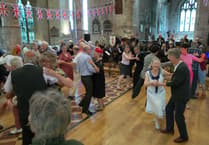A Ross-on-Wye farm is reaping the rewards of a new project from Marks and Spencer to support British beekeeping and locally sourced honey.
Jake Simpson and his brother Rupert run fruit farm Chicory Crops, where together they grow specialist varieties of gooseberries and apples for M&S, across 130 acres of rolling countryside.
M&S has this year introduced over 30 million British honeybees in 600 beehives to 28 of its UK Select Farms across the country, to boost pollination, improve product quality and produce delicious British honey for its customers.
Chicory Crops is one of the Select Farms to introduce new M&S hives onto their land, as part of the retailer’s ‘Farming with Nature’ project.
The busy bees will help M&S produce exclusive single-estate honey this summer – and because honey will be harvested from different farms with natural biodiversity, each crop will have its own unique flavour.
Each Select Farm hosting the hives was chosen because it had a beneficial environment and produced the right crops to sustain the bees, whilst in turn helping the farmers to get greater yields on their crops and produce better-quality food for, due to the thorough pollination the bees provide.
The farm offers an ideal location for encouraging healthy bees and tasty honey – the hives are surrounded by fields of different varieties of fruit and vegetables, offering the bees a variety of flora to thrive on.
Jake’s honey is being produced in small batch quantities, and like all 28 of the Select Farms that are part of the bee project, captures a taste that is completely unique to its location and the nectars available there.
David Wainwright is M&S’s ‘head beekeeper’ and this summer is overseeing M&S’s Select Farm honeybees and is in charge of harvesting the unique crop.
David bought his first two hives in the 1970s and has been producing top-quality honey for M&S for more than a decade with his team of beekeepers from his hives in West Wales, Shropshire and Wiltshire. He supplies around 10,000 jars a week to M&S, and is also an expert honey taster.
David’s process for harvesting and collecting the honey involves slowly and carefully lifting the lid of the beehive, check to make sure the honey is ripe and ready to crop and use a clearer board to safely separate the bees from the comb minimising stress and disturbance.
When all the bees are safely at the bottom of the hive, David removes the boxes on the top containing the honey, before collecting it and taking it back to his factory in Aberystwyth in Wales where they extract the honey by spinning it out of the combs. From there the honey is ready to be packed into jars and supplied to retailers.
Speaking about the project, David said: “It has gone very well, the seasons have been a bit strange with the weather affecting fruit growing, we had a terrific spring crop with the bees getting on the fruit and pollinating, and it has started going again over last few weeks so we have lots of nice honey to choose from.
“The aim of the initiative is to show honey varies from place to place depending on the different foraging conditions for the bees, and to allow customers to explore different flavours and to understand the variation of honey.”
As part of the project David and his team introduced two apiaries to the farm, situated two miles apart, with each apiary having 22 hives and one million bees.
Each apiary will then produce approximately one tonne of local honey.
Jake’s farm needs bees to pollinate the fruit that they then sell to M&S, so the project has been a welcome one at a time when British farming is enduring uncertain times.
“It’s been a tough couple of years for farming so it’s really nice to be part of something positive, and the initiative has had a real positive impact on the farm due to pollination”, said Jake.
“It was the worst spring on record, so the bees were really important for us in getting fruit and there is lots of honey in the hives which is great.”
The farm recently hosted a tour of the apiaries as well as a honey-tasting session with David on June 22.
Following the event, Jake said: “The tour and tasting session went really well, it was great to see how things are done by David and his team and learn something new.”
The honey from Jake’s farm will be kept separate during the bottling and labelling process at M&S, so when it hits the shelves this summer, customers will be able to see that the honey has come from Ross-on-Wye.





Comments
This article has no comments yet. Be the first to leave a comment.